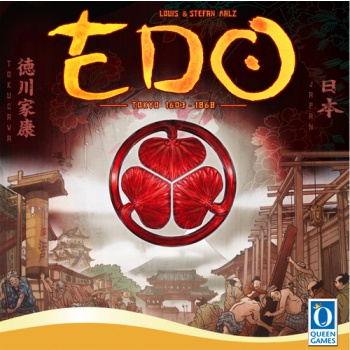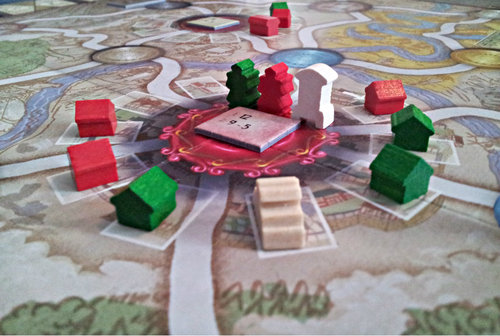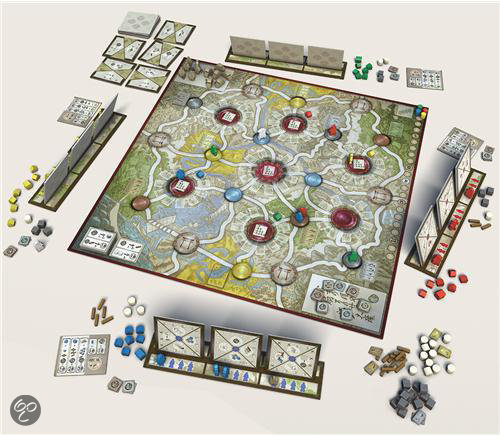Beschrijving
Min leeftijd: +12
Aantal spelers 2 a 4
Gem speelduur 60 min
In Edo vertegenwoordigen spelers Daimyo in het midden van het tweede millennium in Japan, die hun shogun proberen te dienen door hun samurai te gebruiken om kastelen, markten en huizen te bouwen in Tokio en omliggende gebieden.
Aan het begin van Edo – dat in 2010 het ‘beste avondspel’ won in de Hippodice Game Design-wedstrijd onder de naam Altiplano – heeft elke speler vijf samoeraifiches, zeven huizen, één markt en drie vierkante actiekaarten, elk met vier mogelijke acties daarop. Met één kaart kan een speler bijvoorbeeld:
Verzamel rijst (maximaal vier bundels, afhankelijk van het aantal samurai dat op de actie wordt toegepast),
Verzamel $ 5 (per samurai),
Verzamel hout (maximaal vier, met één samoerai in de actie en één in het bos voor elk gewenst hout), of
Bouwen (maximaal twee gebouwen, met twee samoerai op de kaart en één in de gewenste stad, samen met de benodigde grondstoffen)
Elke beurt kiezen de spelers tegelijkertijd welke acties ze willen ondernemen met hun drie kaarten en in welke volgorde, en programmeren ze die acties op hun spelerskaarten, vergelijkbaar met de planningsfase in Wallenstein en Shogun van Dirk Henn. Spelers voeren vervolgens acties uit in beurtvolgorde, waarbij ze indien nodig samoerai op het bord verplaatsen (ze betalen $ 1 per verplaatst veld) om acties te voltooien (naar het bos voor hout, de rijstvelden voor rijst, steden om te bouwen, enzovoort). Voordat een speler echter samoerai kan verplaatsen, moet hij een actie gebruiken om deze op het speelbord te plaatsen; Bij sommige acties is vrije beweging mogelijk, bij andere kan een speler extra samoerai rekruteren naast de eerste vijf.
Met één andere actie kun je extra actiekaarten rekruteren uit een reeks aan de zijkant van het spelbord, waardoor je vier (of meer) kaarten krijgt waaruit je voor de rest van het spel kunt kiezen.
Het bouwen van steden kost grondstoffen en levert je zowel punten als geld op; naarmate er meer spelers in een stad bouwen, wordt het geld verdeeld onder alle aanwezigen, waarbij degenen die het eerst in de stad zijn een groter deel ontvangen. Spelers kunnen ook punten ontvangen of stenen kopen door met een reizende handelaar om te gaan.
Zodra ten minste één speler twaalf punten heeft, eindigt het spel aan het einde van de ronde, waarbij spelers eindspelbonussen scoren voor geld in de hand en andere dingen. De speler met de meeste punten wint.
Edo bevat aparte spelborden voor 2-3 spelers en voor 4 spelers.
In Edo, players represent daimyo in mid-second millennium Japan who are trying to serve their shogun by using their samurai to construct castles, markets and houses in Tokyo and surrounding areas.
At the start of Edo – which won “best evening-length game” in the 2010 Hippodice Game Design competition under the name Altiplano – each player has five samurai tokens, seven houses, one market and three square action cards, each of which has four possible actions on it. One card, for example, allows a player to:
Collect rice (up to four bundles depending on the number of samurai applied to the action),
Collect $5 (per samurai),
Collect wood (up to four, with one samurai on the action and one in the forest for each wood you want), or
Build (up to two buildings, with two samurai on the card and one in the desired city, along with the required resources)
Each turn, the players simultaneously choose which actions they want to take with their three cards and in which order, programming those actions on their player cards, similar to the planning phase in Dirk Henn’s Wallenstein and Shogun. Players then take actions in turn order, moving samurai on the board as needed (paying $1 per space moved) in order to complete actions (to the forest for wood, the rice fields for rice, cities to build, and so on). Before a player can move samurai, however, he must use an action to place them on the game board; some actions allow free movement, and others allow a player to recruit additional samurai beyond the initial five.
One other action allows you to recruit additional action cards from an array on the side of the game board, thereby giving you four (or more) cards from which to choose for the rest of the game.
Building in cities costs resources and gives you points as well as money; as more players build in a city, the funds are split among all present, with those first in the city receiving a larger share. Players can also receive points or buy stone by dealing with a traveling merchant.
Once at least one player has twelve points, the game finishes at the end of the round, with players scoring endgame bonuses for money in hand and other things. The player with the most points wins.
Edo includes separate game boards for 2-3 players and for 4 players.










